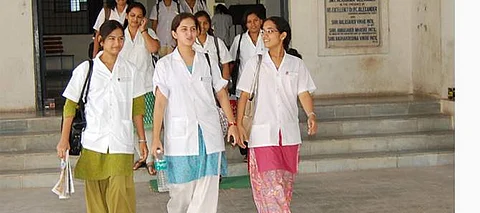

The proposed change in MBBS curriculum by the Medical Council of India to make it competency-based has garnered a positive response from the medical students and teachers alike. The new system is competency-oriented and will focus on practical aspects of medical profession apart from theory and learning.
"According to the current curriculum, knowledge transfer is projected as the most important component to the student," says Dr Sajith Kumar R, Convenor, MCI Nodal Centre, Kottayam. "This does not always give them the capacity to make and execute decisions or to make it suitable for individual patients. This fundamental flaw is very evident in the Indian Medical Graduates (IMGs) who have graduated in the past 20 or more years," he said.
Express finds out more about some of the key highlights of the new system from the industry experts.
AETCOM
The training to meet the patients' and community’s needs will now start from the first year. Ethics, skills, communication issues and psychological attitude are the factors that will be focussed when the training begins. An Attitude, Ethics and Communication (AETCOM ) Module is the first step in this direction.
AETCOM comprising 150 hours is designed exclusively for teaching many non-medical aspects. This module will give students an exposure from the very first day of the course to the humane aspects of health & illness.
"Rather than covering the syllabus, the new curriculum will help shape the IMGs (Indian Medical Graduate) to play five important roles in the society. While being a clinician is important, so is the role of being the leader and member of a team, communicator, life-long learner and ultimately a professional. The new curriculum will definitely help them in this. Competency-based training and assessment are integral parts of this curriculum" said Sajith.
Foundation course
A foundation course aimed at bridging the students from the school environment to a professional environment will be part of the new curriculum. This will happen in the first few weeks. "This will help the students gain a level of maturity and also help them in acquiring knowledge and experience in many aspects like computers, legal awareness, communication skills, health economics, etc. before they start learning medicine," said Sajith.
Early clinical exposure
As of now, the first year MBBS curriculum comprises only the basics. Many a time the students fail to link them with the practical aspects. With the new curriculum, the students will have exposure to the practical aspects in the first year itself.
Integration
MBBS education is highly compartmentalised at present. There will be a very important component of integration within the new curriculum. The students now cover some subjects in the first year and never hear of them again until they are in the final year when they need practical knowledge. By introducing vertical and horizontal integration, students will be in touch with all subjects throughout the graduation period and they will connect everything happening in many specialties for their improved understanding.
Electives
MBBS education is not just a preparation for clinicians and future doctors. It is also an exposure to various aspects of medicine like biomedical engineering, genetic engineering, psychology, research and health economics. The options are many and each student will get an opportunity during the course where they can choose an area of interest and undergo training for eight weeks before the final year. This may help them in nurturing their interests and perhaps selecting better career options.
Preparing colleges and faculty
When a change so massive occurs, the question of how various institutions and teachers will adapt to it is a valid one. However, the Medical Council of India has also helped develop certain training patterns in the past few years. There are 10 nodal centres for this across the country and the one in Kottayam caters to the entire state and a few colleges in Tamil Nadu and Karnataka. There are 10 regional centres too. Under these 20 centres, the faculty are given a four days training. There is also a one-year project-based Advance Course to create leaders to manage the change in the field.
"It has been going on for the past few years and has included thousands of medical teachers in the country. College-level training courses are also organised by the Medical Education Units. One session of the course takes only 30 people because of the highly interactive nature of the sessions," said Sajith.
"We were given MET(Medical Education Training)'s orientation and training programmes last year. Attending AETCOM teachers training is a must as per the MCI guidelines. Personally, I think this will help us in creating a better generation of doctors. For example, things like how a student should respect a cadaver. Whatever work a doctor is doing, they should be aware the recipient is a human being," said Dr G Unnikrishnan, faculty, Ernakulam Medical College.
The introduction of competency-based UG curriculum is committed by the Union Ministry of Health and happens through the leadership of the Academic Cell of MCI. They have shown the green flag for this plan to be implemented starting with the next MBBS batch.
